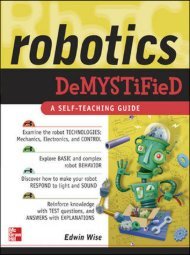Who Needs Emotions? The Brain Meets the Robot
Who Needs Emotions? The Brain Meets the Robot
Who Needs Emotions? The Brain Meets the Robot
You also want an ePaper? Increase the reach of your titles
YUMPU automatically turns print PDFs into web optimized ePapers that Google loves.
24 perspectives<br />
Bro<strong>the</strong>rs, L. (1997). Friday’s footprint. New York: Oxford University Press.<br />
Buccino, G., Binkofski, F., Fink, G. R., Fadiga, L., Fogassi, L., Gallese, V. V., Seitz,<br />
R. J., Zilles, K., Rizzolatti, G., & Freund, H.-J. (2001). Action observation activates<br />
premotor and parietal areas in a somatotopic manner: An fMRI study.<br />
European Journal of Neuroscience, 13, 400–404.<br />
Cacioppo, J. T., Berntson, G. G., & Klein, D. J. (1992). What is an emotion? <strong>The</strong><br />
role of somatovisceral afference, with special emphasis on somatovisceral “illusions.”<br />
In M. S. Clark (Ed.), Emotion and social behavior (Vol. 14, pp. 63–98).<br />
Newbury Park, CA: Sage.<br />
Cannon, W. B. (1927). <strong>The</strong> James-Lange <strong>the</strong>ory of emotions: A critical examination<br />
and an alternative <strong>the</strong>ory. American Journal of Psychology, 39, 106–124.<br />
Damasio, A. R. (1994). Descartes’ error: Emotion, reason, and <strong>the</strong> human brain. New<br />
York: Grosset/Putnam.<br />
Damasio, A. R. (1999). <strong>The</strong> feeling of what happens: Body and emotion in <strong>the</strong> making<br />
of consciousness. New York: Harcourt Brace.<br />
Darwin, C. (1965). <strong>The</strong> expression of <strong>the</strong> emotions in man and animals. Chicago:<br />
University of Chicago Press. (Original work published 1872)<br />
Dimberg, U. (1982). Facial reactions to facial expressions. Psychophysiology, 19, 643–<br />
647.<br />
Dimberg, U., Thunberg, M., & Elmehed, K. (2000). Unconscious facial reactions<br />
to emotional facial expressions. Psychological Science, 11, 86–89.<br />
Ekman, P., & Davidson, R. J. (1993). Voluntary smiling changes regional brain activity.<br />
Psychological Science, 4, 342–345.<br />
Fridlund, A. J. (1994). Human facial expression. New York: Academic Press.<br />
Frijda, N. H. (1986). <strong>The</strong> emotions. New York: Cambridge University Press.<br />
Gallese, V., Fadiga, L., Fogassi, L., & Rizzolatti, G. (1996). Action recognition in<br />
<strong>the</strong> premotor cortex. <strong>Brain</strong>, 119, 593–609.<br />
Gallese, V., & Goldman, A. (1999). Mirror neurons and <strong>the</strong> simulation <strong>the</strong>ory of<br />
mind-reading. Trends in Cognitive Sciences, 2, 493–500.<br />
Hari, R., Forss, N., Avikainen, S., Kirveskari, E., Salenius, S., & Rizzolatti, G. (1998).<br />
Activation of human primary motor cortex during action observation: a neuromagnetic<br />
study. Proceedings of <strong>the</strong> National Academy of Sciences of <strong>the</strong> USA, 95,<br />
15061–15065.<br />
Hess, U., & Blairy, S. (2001). Facial mimicry and emotional contagion to dynamic<br />
emotional facial expressions and <strong>the</strong>ir influence on decoding accuracy. International<br />
Journal of Psychophysiology, 40, 129–141.<br />
Iacoboni, M., Woods, R. P., Brass, M., Bekkering, H., Mazziotta, J. C., & Rizzolatti,<br />
G. (1999). Cortical mechanisms of human imitation. Science, 286, 2526–2528.<br />
Jaencke, L. (1994). An EMG investigation of <strong>the</strong> coactivation of facial muscles<br />
during <strong>the</strong> presentation of affect-laden stimuli. Journal of Psychophysiology,<br />
8, 1–10.<br />
James, W. (1884). What is an emotion? Mind, 9, 188–205.<br />
Lazarus, R. S. (1991). Emotion and adaptation. New York: Oxford University Press.<br />
LeDoux, J. (1996). <strong>The</strong> emotional brain. New York: Simon and Schuster.<br />
Levenson, R. W., Ekman, P., & Friesen, W. V. (1990). Voluntary facial action gen-






